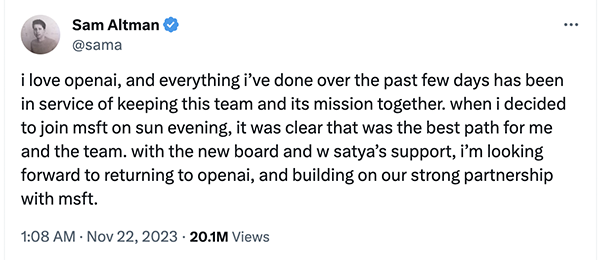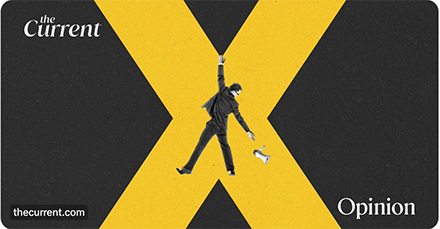 |
||||||||||
|
||||||||||
| OpenAI’s Infamous Game of Thrones Ends With Sam Altman Back on Top |

Image sourced from Shutterstock
|
| You’re fired! It’s been a tumultuous few weeks for OpenAI, the star generative AI company that was supposed to define our technological future. From what has been revealed, the four-member Board of Directors was miffed by something CEO Sam Altman said (or didn’t?). So, on Friday, November 17th, the board fired him. The news didn’t sit well with OpenAI employees and key members of the executive team who vowed to stand shoulder-to-shoulder with Altman. By Monday, 730 of the 800 employees signed a letter saying that either the board resigns or they will walk out the door. And as fate would have it, those employees all have jobs waiting for them. While OpenAI’s board of directors was busy announcing one interim CEO after another, Microsoft announced that OpenAI’s loss was their gain. Altman and Greg Brockman, OpenAI’s former president and board chair, joined Microsoft to lead a new advanced AI team. Given that Microsoft invested $13 billion in OpenAI, one can imagine this was an easy decision for Satya Nadella, Microsoft’s CEO, to make. True, Microsoft’s stock took a $48 billion hit when Altman was fired, but it has since recovered. You’re hired! Microsoft’s dreams of an advanced AI team were shattered just a few days later when OpenAI announced it had rehired Altman to lead the company. What changed? New board members — Bret Taylor, Larry Summers, and Adam D'Angelo. Rumor has it AI safety was the issue. We don’t know much about the OpenAI Board’s decision beyond their feeling that he was "not consistently candid in his communications with the board, hindering its ability to exercise its responsibilities." The LA Times reports that the real concern was AI safety and “whether Altman was building and selling AI responsibly.” AI safety has been a central concern for the past six months. In July, the Biden Administration announced it had gathered commitments from seven AI companies, including OpenAI, to “manage the risks posed by Artificial Intelligence (AI) and to protect Americans’ rights and safety.” Then, in August, the Center for AI Safety made headlines with its ridiculous warning that AI can lead to the global extinction of humanity. And in October, President Biden signed another executive order, on AI safety. In lieu of commitments, the second EO requires companies to report to the federal government about the risks of their wares, and to conduct assessments of their impact on equity and civil rights guidance, and research on AI's impact on the labor market, which is to say, the real threats that AI poses. A board, unlike others. If OpenAI were a for-profit company, its board members may opt to strike a balance between profit and AI safety. In truth, however, OpenAI is a research organization that consists of the non-profit OpenAI, Inc. which is a subsidiary of for-profit subsidiary OpenAI Global, LLC. The board is structured to ensure the safe development of AI, not maximize profits. If Altman was truly lax with AI safety, the board would have plenty of reason to be concerned, and possibly act the way it did. Of course, we don’t know the full story. |
| At the moment, the consensus is that the OpenAI board made a bad decision when it fired a beloved CEO, which caused panic in the many companies that use ChatGPT. To Evan Epstein, executive director of the Center for Business Law, this entire drama could have been avoided had the company paid closer attention to corporate governance. “In Silicon Valley, people don't tend to focus on governance. But bad governance can destroy a company,” he told Fortune. To experts, OpenAI made five key governance mistakes, from its initial “weird” board structure to a small and inexperienced board making a bad decision. Time will tell if OpenAI survives as a company or if it’s absorbed into Microsoft entirely, but for now, other start-up tech companies are looking at the company for clues as to how not to behave. There’s another reason why this story is important: it’s a rare example of the power of employees to have a say in who leads the company. OpenAI could have withstood Altman leaving, but not the 700+ employees who pledged to follow him. |
|
| YouTube's Warning Shots: The Fight Against Ad Blockers Intensifies |
 |
| YouTube is intensifying its efforts in the ongoing struggle against ad blockers, issuing clear warnings about the potential consequences of using the software. This recent stance by YouTube marks an escalated battle against ad blockers. Starting in June 2023, the platform initiated measures preventing users with ad blockers from accessing videos According to a statement provided to Business Insider by YouTube, the platform is actively advocating for viewers to reconsider the use of ad blockers and either permit advertisements or opt for YouTube Premium, which eliminates ads. Additionally, YouTube suggests that individuals employing ad blockers might encounter a subpar experience. YouTube has clarified that its ad blocker detection does not discriminate among specific browsers, acknowledging reported delays across all browsers. However, users persisting with ad blockers will continue to endure an inferior viewing experience. "In the past week, users using ad blockers may have experienced suboptimal viewing, which included delays in loading, regardless of the browser they are using. Users who have uninstalled their ad blockers may still experience a temporary delay in loading and should try refreshing their browser," said a YouTube spokesperson. |
| It’s understandable why YouTube is concerned about ad blockers. Consumers have used ad blockers at an exorbitant rate since 2018, according to a study by Blockthrough. Marty Krátký-Katz, Blockthrough's CEO and Founder, highlights that while users desire an uninterrupted online experience, they perceive a lack of improvement or even a decline in the quality of advertisements. In their 2021 survey encompassing over 5,000 individuals, 67% shared this viewpoint. “Despite advancements such as the Better Ads Standard, the perceived advantages of a more refined ad experience haven't reached everyday users. If this remains unchanged, the trend of ad-blocking growth will persist,” said Krátký-Katz. Is YouTube penalizing consumers for using ad blockers the right move, or should they work on improving their ad experience? Questions that need answers. |
| Around the Water Cooler |
| Here's what else you need to know... Elon Musk Wants to Sue His Way out of Brand Safety Requirements. While most publishers and platforms beef up their Trust & Safety teams, deploy AI tools to spot and remove toxic content, and establish robust brand safety and brand-suitable policies to protect their brands, users and advertisers, Elon Musk has a different approach: file a “thermonuclear lawsuit.” This isn’t the first time Musk has threatened legal action against advertisers. In November 2022, he said “thermonuclear name and shame” to advertisers who hit the pause button as they axed Twitter’s Trust & Safety team. Yeah, that’ll work, Elon. New MFA Detection Tech Hits the Ad Tech Streets Pixalate, a platform that safeguards against ad fraud, launched its MFA detection technology. The tech will identify and prevent MFA websites, CTV, and mobile apps. The MFA solution categorizes these platforms based on their risk level—high, medium, or low—in a Beta release across the Pixalate product suite. By utilizing historical programmatic transaction data encompassing various apps, pages, and URLs, Pixalate's MFA detection technology recently identified over 15,000 MFA websites and apps as high-risk in an October 2023 assessment. Newsguard Calls Out X for Monetizing Israel-Hamas Misinformation Speaking of Musk, remember those oh-not-so-coveted Blue checks on Elon’s X? Well, it just turns out that those verified accounts served as a playground for bad actors eager to spread misinformation about the Israel-Hamas conflict. And, guess what? X monetized the misinformation. Newsguard found that 200 ads from prominent brands, governments, non-profits, and educational institutions showed up on feeds alongside viral posts on these very prominent verified accounts. Of course, X is calling foul play. |
 |
||||
|
||||
 |
||||
 |
||||
|
||||
| @{optoutfooterhtml}@ |








